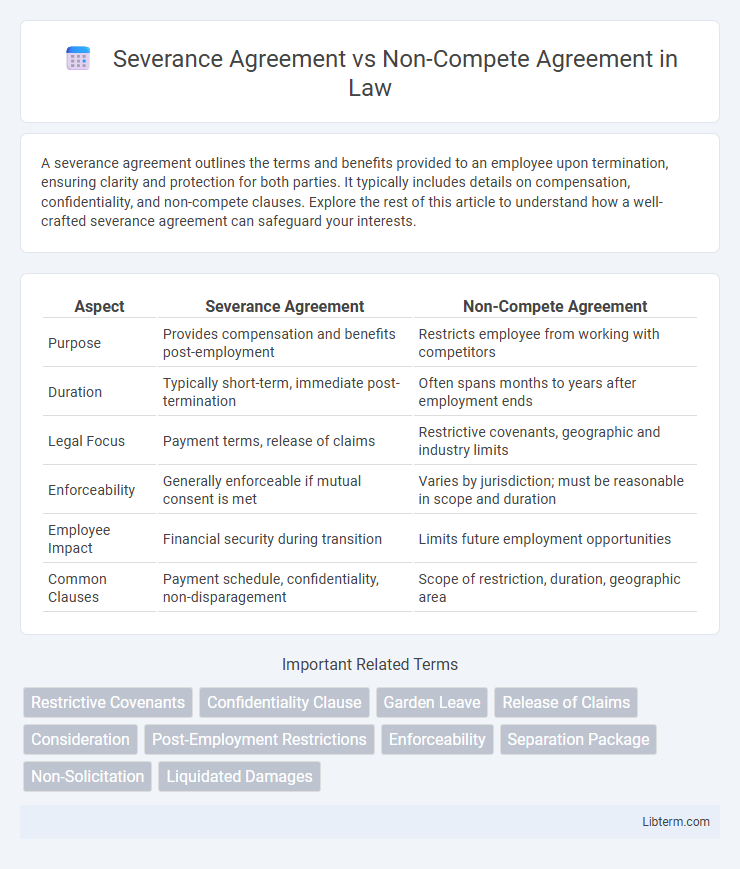A severance agreement outlines the terms and benefits provided to an employee upon termination, ensuring clarity and protection for both parties. It typically includes details on compensation, confidentiality, and non-compete clauses. Explore the rest of this article to understand how a well-crafted severance agreement can safeguard your interests.
Table of Comparison
| Aspect | Severance Agreement | Non-Compete Agreement |
|---|---|---|
| Purpose | Provides compensation and benefits post-employment | Restricts employee from working with competitors |
| Duration | Typically short-term, immediate post-termination | Often spans months to years after employment ends |
| Legal Focus | Payment terms, release of claims | Restrictive covenants, geographic and industry limits |
| Enforceability | Generally enforceable if mutual consent is met | Varies by jurisdiction; must be reasonable in scope and duration |
| Employee Impact | Financial security during transition | Limits future employment opportunities |
| Common Clauses | Payment schedule, confidentiality, non-disparagement | Scope of restriction, duration, geographic area |
Introduction to Severance and Non-Compete Agreements
Severance agreements outline terms for employee termination, including compensation, benefits, and confidentiality clauses to protect both parties. Non-compete agreements restrict an employee's ability to work with competitors or start similar businesses within a defined geographic area and time frame after leaving the company. Understanding these agreements is crucial for defining post-employment obligations and protecting business interests.
Definition of Severance Agreement
A Severance Agreement is a legally binding contract between an employer and an employee that outlines the terms of employment termination, including compensation, benefits, and confidentiality clauses. It typically provides financial support or benefits in exchange for the employee's agreement not to pursue legal claims against the employer. Unlike a Non-Compete Agreement, which restricts the employee's ability to work for competitors after leaving the company, a Severance Agreement focuses on the conditions of departure and severance compensation.
Definition of Non-Compete Agreement
A Non-Compete Agreement is a legally binding contract that restricts an employee from engaging in competing business activities within a specified geographic area and time frame after leaving an employer. This agreement aims to protect trade secrets, confidential information, and customer relationships by limiting the employee's ability to work for direct competitors or start a similar business. Unlike Severance Agreements, which outline terms for compensation upon termination, Non-Compete Agreements specifically focus on post-employment competitive restrictions.
Key Differences Between Severance and Non-Compete Agreements
Severance agreements primarily address the terms of an employee's departure, including compensation, benefits continuation, and release of claims, while non-compete agreements restrict an employee's ability to work in competing businesses after leaving the company. Severance agreements are negotiated at termination or resignation, focusing on financial and legal protections, whereas non-compete clauses are often part of the initial employment contract to protect trade secrets and business interests. Enforceability varies significantly, with severance agreements generally upheld if mutually agreed upon, while non-compete agreements face stricter scrutiny based on scope, duration, and geographic limitations.
Purpose and Benefits of Severance Agreements
Severance agreements provide financial protection and support to employees upon termination, ensuring clarity on compensation, benefits, and post-employment obligations. These agreements help mitigate legal risks for employers by securing releases of claims and fostering smoother transitions. Unlike non-compete agreements, severance agreements primarily focus on financial and contractual closure rather than restricting future employment opportunities.
Purpose and Benefits of Non-Compete Agreements
Non-Compete Agreements protect a company's proprietary information and customer relationships by restricting employees from joining competitors or starting similar businesses within a specified geographic area and time frame. The primary benefit is safeguarding trade secrets and maintaining competitive advantage, which prevents potential revenue loss and market share erosion. Unlike Severance Agreements that handle post-employment compensation and benefits, Non-Compete Agreements focus on limiting future employment choices to protect business interests.
Legal Enforceability: Severance vs Non-Compete
Legal enforceability of severance agreements typically hinges on the proper execution of release clauses and compliance with state-specific labor laws, ensuring employees waive certain rights in exchange for agreed compensation. Non-compete agreements face stricter scrutiny, with courts often limiting enforceability based on reasonableness in scope, duration, and geographic area to protect employees' right to work. Both agreements require careful drafting to balance employer protections and employee rights under evolving legal standards.
Common Clauses in Severance Agreements
Severance agreements commonly include clauses such as release of claims, confidentiality, non-disparagement, and severance payment terms, which ensure mutual protection between employer and employee post-termination. These agreements often outline continuation of benefits, return of company property, and dispute resolution mechanisms. Unlike non-compete agreements that restrict future employment opportunities, severance agreements focus on compensation and legal protections following employment separation.
Typical Restrictions in Non-Compete Agreements
Non-compete agreements typically impose restrictions that limit an employee's ability to work for competitors or start a competing business within a specific geographic area and timeframe after leaving a company. These agreements often include clauses on duration, geographic scope, and the scope of restricted activities to protect trade secrets and maintain competitive advantage. In contrast, severance agreements primarily focus on compensation and benefits provided upon termination, rather than ongoing employment limitations.
Choosing the Right Agreement: Factors to Consider
Choosing between a Severance Agreement and a Non-Compete Agreement depends on factors such as the nature of the employee's role, potential risks to the business, and legal enforceability in the jurisdiction. Severance Agreements typically address compensation and benefits upon termination, while Non-Compete Agreements restrict post-employment activities to protect trade secrets and customer relationships. Employers must weigh employee retention goals, competitive market conditions, and state-specific restrictions to determine the most effective contract for both parties.
Severance Agreement Infographic

 libterm.com
libterm.com